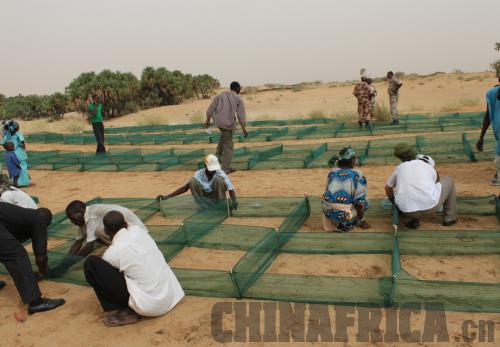|
 |
|
Experts from Gansu Desert Control Research Institute demonstrate on-job training for local farmers and technicians on desertification control (TIAN PING) |
Desertification is like a skin disease. It is mainly caused by an area receiving extremely low amounts of precipitation that are insufficient to support the growth of most plants.
Africa is facing serious challenges caused by desertification. Of the continent's total land area, 66 percent is classified as arid or semi-arid, and 73 percent of its agriculturally-useful dry land is already degraded. The United Nations Environment Program estimates that owing to desertification Africa loses some $9 billion a year, nearly 20 percent of the world's annual $42 billion annual losses due to desertification.
Owing to the threat that desertification poses to natural resources, agriculture and animal husbandry, African policymakers have recognized the urgency and necessity of fighting desertification. According to Dr. Mansour N'Diaye, Chief of Cabinet of the United Nations Convention to Combat Desertification Secretariat, several countries in Africa have come together and organized local communities to form a 12,000-square-km-long 'great green wall' extending from Senegal to Djibouti. "People's participation is crucial to reclaiming lands," he said. Yet, with limited technology, capacity and financial support, the continent needs help from outside sources in the battle against desertification.
Fortunately, external assistance has already been offered. Under the UNEP-China-Africa Cooperation Program on the Environment, funded by China's Ministry of Science and Technology, the Desert Control Research Institute of Gansu Province of China in collaboration with the Xinjiang Ecology and Geology Research Institute of the Chinese Academy of Sciences, Lanzhou University and Gansu Complanatus Ecological and Engineering Corp. is developing and demonstrating technologies to combat desertification in Algeria, Kenya, Niger, Nigeria and Egypt. China's experience with desertification monitoring and planning, sand control and sand industrial technologies will be shared with Africa in an effort to build the continent's own desertification control and adaptation capacity.
In China, the State Forestry Administration has referred to desertification as "the most serious ecological problem facing the country." For a long time, desertification poses a great danger to the country's sustainable development. After years of continued efforts, however, China has begun to gain ground in its battle against the desert through afforestation, environmental protection, natural regeneration and many other practices and technologies.
In June 2012, a project team from the Gansu Desert Control Research Institute made a visit to Niger. In cooperation with the local government and related professional departments, the team conducted surveys and studies of the local level of desertification control, and agricultural and animal husbandry technologies. The team also gave a series of technology trainings and demonstrations. Over 30 local technicians in related specialties and 180 farmers received on-site training covering millet and maize cultivation technologies and rainwater harvesting technologies used in forestation and desert control practices.
"Joint research conducted by the Africa Desertification Control Initiative and China on combating desertification will certainly bring about further environmental and economic development, in addition to enhancing the existing cordial bilateral relationship between China and Nigeria," said Dr. Umar Danladi Dahiru, Executive Director of the Africa Desertification Control Initiative. "The project is laudable and timely."
A 3-month comprehensive training course on eco-restoration of desertification-prone regions and eco-industrial development technologies was also held at the Gansu Desert Control Research Institute from July to September 2012 for 18 experts from Kenya, Lesotho, Nigeria, Ethiopia, Ghana and other nations.
(Author Dr. Mohamed A.S. Abdel-Monem is the Regional Team Leader of Ecosystem Management for the ROA/UNEP and a central figure in the UNEP China-Africa Program. Ms. Tian Ping is Dr. Mohamed's assistant, and a special coordinator of the Program) |